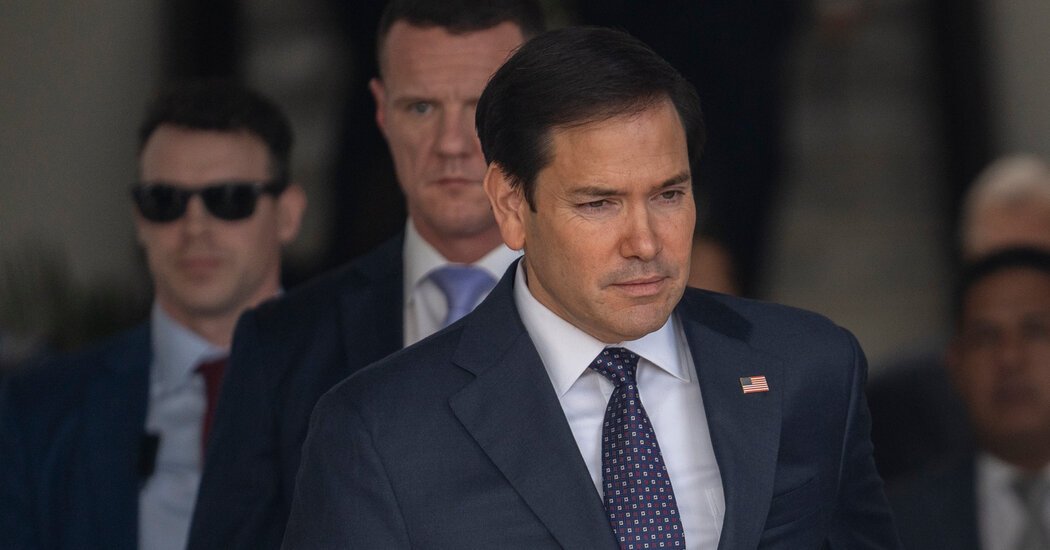State Dept. to Designate Latin American Cartels as Terrorist Groups
The Trump administration plans to designate more than a half-dozen criminal groups with roots in Latin America as foreign terrorist organizations, said five U.S. officials with knowledge of the imminent action.
The move, to be carried out by the State Department, follows an executive order President Trump signed on Jan. 20 calling for a crackdown on major cartels. The designation is expected to be applied to eight groups, said two of the officials, though the list could change before a public announcement. The officials who spoke for this article did so on the condition of anonymity to talk about an action that has not been made public yet.
The executive order called for the designations, saying the cartels “constitute a national-security threat beyond that posed by traditional organized crime” and that the United States would “ensure the total elimination” of the groups.
Mr. Trump gave Secretary of State Marco Rubio two weeks to make the designations in consultation with several other cabinet members. The criminal groups and their members could be labeled foreign terrorist organizations or specially designated global terrorists, according to the order. The designations mean the U.S. government can impose broad economic sanctions on the groups and on people or entities linked to them.
The executive order referred in general to cartels in Mexico. It also specifically named Tren de Aragua, a group with roots in Venezuela, and Mara Salvatrucha, or MS-13, a gang founded by Salvadoran immigrants in the United States that plays a lesser role in the transnational drug trade.
Besides those two groups, the State Department plans to designate the Clan del Golfo, based in Colombia, and five others based in Mexico. The Mexican organizations that will be designated are the Sinaloa cartel, Jalisco New Generation cartel, the Northeast cartel, the Michoacán family and the United cartels, according to U.S. officials.
The State Department has informed several congressional committees of the upcoming designations, which could be announced by the White House as early as this week. The department did not reply to a request for comment.
Clan del Golfo, or Gulf Clan, has worked for over two decades with Mexican cartels, supplying cocaine for them to smuggle into the United States. After the price of cocaine plunged in 2017, the Colombian cartel moved aggressively into migrant smuggling to make up its financial losses.
A U.S. official with knowledge of the designation list said that the Gulf Clan was likely being added for its involvement in migrant trafficking. The group largely controls the Darién Gap, the narrow land bridge that connects South and North America.
Migrants from around the world — from China to Sudan to Venezuela — often fly to more permissible South American countries before heading to the Darién Gap on their journeys north to the United States. Many of those migrants pay thousands of dollars to operatives working for the Gulf Clan, as a protection fee for traversing the land bridge.
The designation list was supposed to be completed last week, but may have been delayed because the State Department expanded it from the groups outlined in the executive order last month, according to a person familiar with the matter. Whether or not to include organized crime groups involved in migrant trafficking was discussed at length, partly causing the delay.
The Mexican cartels included on the list work closely with the Gulf Clan to smuggle migrants across Latin America into the United States.
Mr. Rubio completed his first trip as secretary of state this month, visiting five countries in Latin America. He spoke with his counterparts about migration and security issues, though he did not visit Mexico.
In an interview with the podcast host Megyn Kelly on Jan. 30, Mr. Rubio talked about the need to dismantle Mexican drug cartels, saying that “there are parts of Mexico, many parts of Mexico, in which the government doesn’t control those areas.”
“They’re controlled by drug cartels,” he continued. “They are the most powerful force on the ground, and they are plowing into the United States.”
“They’re facilitating illegal migration, but they are also bringing in fentanyl and deadly drugs to our country,” he added. “That’s a national security threat, and that needs to stop.”
In a call with his counterpart in Argentina on Monday, Mr. Rubio had discussed “shared security priorities in the region, including combating transnational organizations,” the State Department said.
Mexican officials have been in drawn-out negotiations with the Trump administration to stave off the terror designation for the cartels and organized crime groups that operate in their country, according to people familiar with the talks.
Of the eight groups designated, five are Mexican. The Sinaloa and Jalisco New Generation cartels are the country’s largest and have cornered much of the fentanyl market for the United States, producing the synthetic opioid in Mexico before smuggling it north. A growing amount of fentanyl is being used by Mexican citizens, leading to rising addiction rates in the country.
The designation list includes a smaller cartel, Northeast, and two Mexican groups that American officials say are more akin to organized criminal organizations: the Michoacán Family and United cartels. Those groups tend to act as on-the-ground muscle for Mexico’s cartels to help them spread their territorial control.
An organized crime group is considered a cartel only if it controls enough of the drug trade to allow it to determine the price of any given narcotic in places like New York or London.
The net profits from the international operations of Mexico’s cartels could reach up to $20 billion annually, nearly 2 percent of Mexico’s gross domestic product, according to an American official.




Post Comment